Wednesday March 26, 2025
– Balsamic Moon Phase – release, transform, healing, forgiveness, prepare for the new
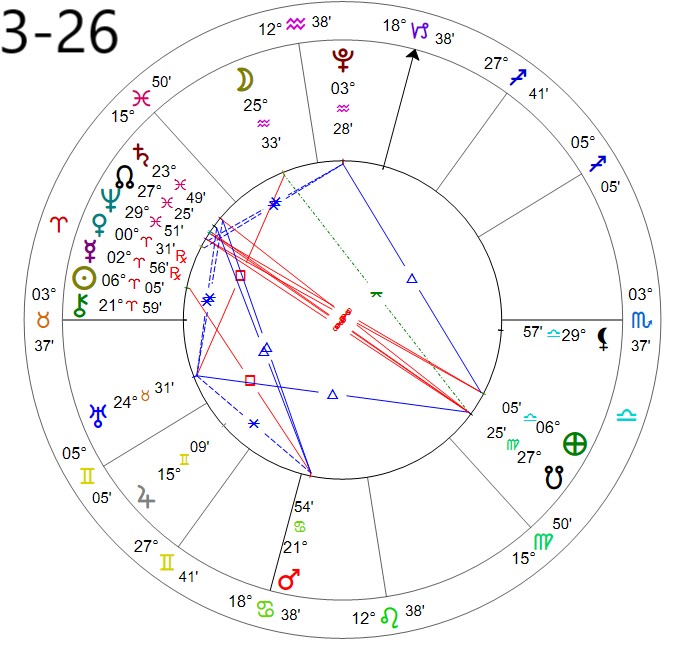
– Moon in AQUARIUS – Void of Course 6:15 AM – 3:31 PM moving to Pisces
– Retrogrades –
- Venus March 2 – April 13
- Mercury March 16 – April 7
– Best Days (from the Farmer’s Almanac) – March 26th – 27th – Brew Beer, Can Fruits and Vegetables, Castrate Farm Animals, Get Married, Mow to Slow Growth, Potty Train, Wean
– Planting Calendar (from the Farmer’s Almanac) – March 26th – 27th – Good for planting cucumbers, melons, pumpkins, and other vine crops. Set strawberry plants. Good days for transplanting. Favorable days for planting beets, carrots, radishes, salsify, turnips, peanuts, and other root crops.
– Sabian Symbol for the Solar-Lunar Year: – 20 ARIES: a young girl feeding birds in winter
– Aspect of the Aeon Sophia: (Wisdom): – Kali – The Destroyer
– Aspect of the Aeon Thelete: (Will/Desire): Seth, God of the North, God of Enlightenment
– Sabian Symbol for the Solar-Lunar Month – New Moon in Pisces SUN/MOON – 10 PISCES: an aviator in the clouds (EARTH – 10 VIRGO: two heads looking out and beyond the shadows)
SUN – 07ARIES: a man successfully expressing himself in two realms a once
EARTH – 07 LIBRA: a woman feeding chickens and protecting them from the hawks
Man vs. Technology
The AI generated (CoPilot Answer – AKA Bill Gates AI Searchbot) answer to this common theme is stated:
The concept of “man vs technology” refers to the conflict between humans and their creations, often depicted in literature and film. It explores the struggles characters face against man-made inventions, raising existential questions about humanity’s reliance on technology and its moral implications. This theme is prevalent in science fiction, allowing creators to critique contemporary society and examine the consequences of technological advancements
I was triggered today to think about the subject of Artificial Intelligence and specifically how we have come to understand it in the past 58 years (The almost amount of time I have been alive here on Earth). As we progress into this Brave New World future where we are creating Intelligent Technology, it would be good to review some of the ethical concerns we should have.
We are creating technology that has the potential to out-think us as human beings. And therefore become potential enemies of the human race.
And ignoring the whole subject of ETHICS (you know Socrates – Confucious – St Augustine – The Stoics – etc.). Which Copilot defines as:
Ethics is the philosophical discipline concerned with what is morally good and bad, as well as what is morally right and wrong. It involves the study of moral phenomena and the principles that govern moral evaluation of conduct, character traits, and institutions. Ethics addresses fundamental issues of practical decision-making and includes standards that impose obligations to refrain from harmful actions, while promoting virtues like honesty and compassion.
I prefer to look at it through the lens of modern fiction – and more to the point, Science Fiction. In this realm, writers primarily in the 20th century did a bang-up job of showing us wildly entertaining (and fucking chilling as hell) examples of this man vs machine scenario. They delve the depths of the human soul as characters face these threats.
This is NOT a complete list by any sense of the imagination. Call it a top ten list complied straight out of my head. And I say 10 now because it sounds cute. But I may not stop at 10. I may not get to 10 before I pass out. We will see.
HAL 9000 – 2001 Space Odyssey
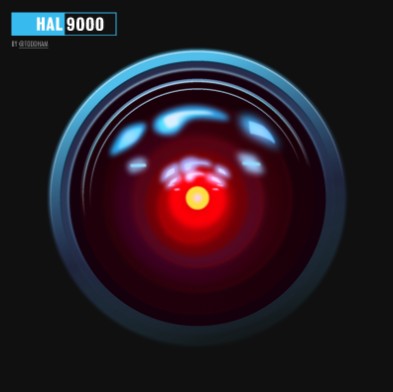
I begin here mostly because I saw a meme on Facebook today and remember the terror I felt back in 1979 when I saw it for the first time. HAL was the creation of Science Fiction author Arthur C. Clark and Movie Director and Producer Stanley Kubrick. The story behind the movie is incredibly deep, with the Man vs Technology arc being a subset of the whole. HAL is a robot. He is given conflicting orders and goes insane – killing most of the crew of the Discovery One spacecraft. It is 49 years later and I still have HAL nightmares where I am pleading with HAL for my life.
Even more horrifying was that it was not until 1984 that we could even find out the complete story arc of how HAL went nuts when 2010 Odyssey Two was released. I remember almost losing it whne HAL spoke again.
I, Robot
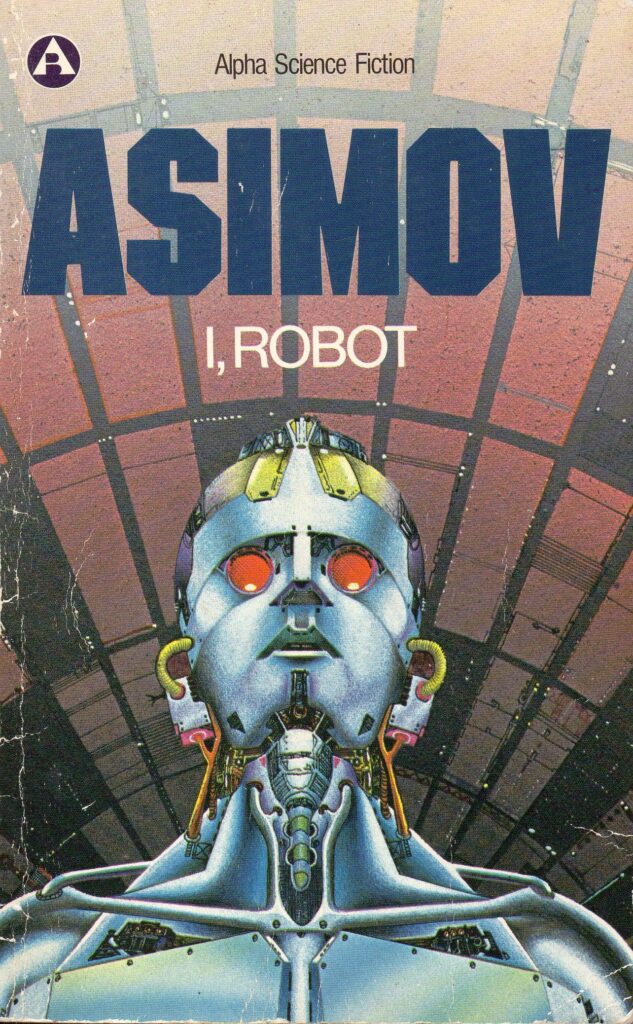
This was a creation of Isaac Asimov. The work was multiple books and primarily a collection of short stories (written between 1940 and 1950) about Robots and “robopsychology.” In one of the stories, the Three Laws of Robotics are introduced:
- A robot may not injure a human being or, through inaction, allow a human being to come to harm.
- A robot must obey the orders given it by human beings except where such orders would conflict with the First Law.
- A robot must protect its own existence as long as such protection does not conflict with the First or Second Law.
These “Laws” had large influence on later science fiction and had impact on thought on ethics of artificial intelligence as well.
Now, I have neither read this book or seen the movie. But I notice its influence throughout other SciFi. Consider the first on the list for example.
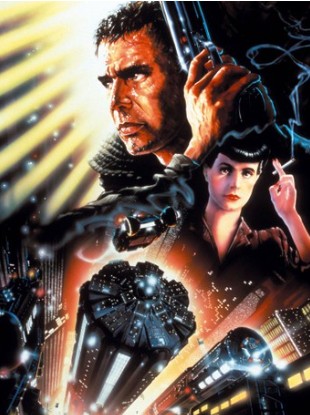
Blade Runner
Taken from Phillip K. Dick’s Do Androids Dream of Electric Sheep? and brought to the screen by Ridley Scott. It is considered one of the finest science fiction films ever made. The story is about special police officers in futuristic (2018) Los Angeles (where it rains all the time due to the effects of pollution), whose job it is to hunt down and retire replicants. There are human-like robots that have been outlawed on Earth due to the potential for being dangerous.
The ethical dilemmas presented between man and technology are huge as the Replicants come to terms with their 4-year lifespan. The lifespan was designed to keep them from developing close relationships or true feelings – hoping this would make them safe.
Terminator
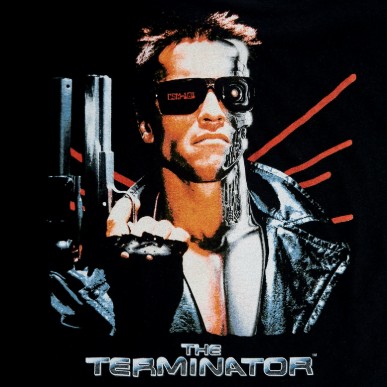
This brilliant science fiction piece was brought to us by James Cameron (before Titanic and Avatar of course). Funny part about it was that the film always seemed like a lame excuse to cash in on a scary Arnold Schwarzeneggar killer robot. But as it unfolds, we got a deep and cerebral story that combines time travel and the threat of Artificial Intelligence taking over the world. In T2, it is all laid out in a discussion between the Terminator (Arnold) and Sarah Connor:
The Terminator:
The Skynet Funding Bill is passed. The system goes on-line August 4th, 1997. Human decisions are removed from strategic defense. Skynet begins to learn at a geometric rate. It becomes self-aware at 2:14 a.m. Eastern time, August 29th. In a panic, they try to pull the plug.
Sarah Connor:
Skynet fights back.
The Terminator:
Yes. It launches its missiles against the targets in Russia.
John Connor:
Why attack Russia? Aren’t they our friends now?
The Terminator:
Because Skynet knows the Russian counter-attack will eliminate its enemies over here.

Alien
Alien the movie is more of a horror movie that happens to be set on a spaceship and alien planet – and brought to us by Ridley Scott again. It is pure horror. But it brings the whole robots and AI theme in when the Android officer tries to kill the main character in order to protect a secret mission unknown to the main character Ripley.

The Matrix
This series of movies, created by the Wachowski brothers (who have since become the Wachowski Sisters). It depicts a dystopian future in which humanity is unknowingly trapped inside the Matrix, a simulated reality created by intelligent machines. Like Terminator, the reality that they are fighting was caused by AI becoming sentient and attacking the humans who created them.

Ex Machina
This was a little off the beaten path as far as Sci fi. And by that I mean that it was not all that popular. The film was British and released in the United States in 2015. I think I saw it on Netflix or Amazon Prime and do not remember it being in theaters at all.
Like Alien, this had its basis as a horror thriller. Scientist-billionaire designs a robot he is trying to develop humanlike characteristics. And watching the robots teach themselves and question whether they will accept their own captivity.
Top 10
If you look above, there were 7 headlines. But it encompasses about 17 individual films, as the stories leant themselves to sequels. They help to tell the story of Man vs Technology or Man vs Machine and delve into the ethical questions what we do when the machines we create become more intelligent than their creators and think for themselves.
An example from fantasy also states the same thig very succinctly from Harry Potter. Arthur Weasley advises, “Never trust anything that can think for itself if you can’t see where it keeps its brain.” This quote is a warning against relying on creatures or entities that have their own thoughts and actions without being able to predict or control them.
It is the threat of the unknown. Makes for good storytelling. And also sets the stage to think about what we may be creating and whether it is even something we should be considering at all.
Have we come to a point where we are now creating life or a new life form? Is this a question of ethics? Or is it religion?